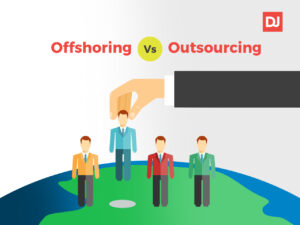Software development outsourcing has become a key strategy aiming to optimize operations and boost technological capacities for businesses. Interestingly, a Statista study discloses that approximately 59% of businesses adopt outsourcing primarily to curb costs and to harness specialized skills.
Bringing an external partner on board often enhances resource allocation and fosters efficiency. However, given the competitive market and the specific needs of each business, pinning down the ideal vendor could be a challenging feat. Even more, you may find that outsourcing might not precisely fit the needs of your company. Luckily there are other options out there.
Let’s explore if software outsourcing is the right choice for you, discussing its benefits and types and even exploring other options for scaling your business with external software developer hiring. All to help you make the right choice based on your unique needs and resources.
Jump To:
What is Software Development Outsourcing?
Software outsourcing refers to the practice of delegating software development, design, testing, or other related tasks to external third-party vendors or service providers.
Rather than handling all aspects of software development in-house, this strategy allows companies to collaborate with external experts who possess the necessary skills and resources.
Types of Software Outsourcing
- Offshore outsourcing: Involves partnering with software development companies located in countries that offer cost advantages due to lower labor costs. Offshoring is particularly popular for companies seeking to reduce expenses while maintaining access to skilled talent.
- Nearshore Outsourcing: Nearshore outsourcing involves collaborating with software development providers located in neighboring or nearby countries. This model offers benefits such as overlapping working hours, cultural similarities, and potentially reduced travel costs.
- Onshore Outsourcing: Onshore outsourcing, also known as domestic outsourcing, involves contracting software development services from companies within the same country. While it may not provide the same cost savings as offshore options, onshore outsourcing offers the advantage of working within the same legal and regulatory framework, as well as minimizing language and cultural barriers.
- Staff Augmentation: Staff augmentation is a business strategy where a company hires external professionals or teams to supplement its existing workforce and fulfill specific project or skill needs. These external resources work alongside the company’s in-house staff.
What Are The Benefits of Software Outsourcing?
Outsourcing software engineering can significantly impact your company’s operations and growth. Here’s why:
1) It’s Cost Efficient
One of the primary reasons companies opt for software outsourcing is cost savings. Outsourcing to countries with lower labor costs can lead to significant reductions in development expenses, including salaries, infrastructure, and overhead.
Here’s a simple example of how much money you can save by hiring remote developers:
Let’s say your business needs a Java developer. If you’re located in the U.S., the average salary of a Java developer is $117,000 (Indeed). But if you decide to outsource or hire in Brazil, then the salary is reduced to $54,000 (Plane). You are saving $63,000 without losing quality.
2) You Get Access to a Skilled Talent Pool
A survey conducted by Daxx revealed that 61% of respondents stated that access to a larger and better talent pool was a primary reason for outsourcing software development.
Outsourcing allows businesses to tap into a global talent pool of specialized developers, designers, and engineers. This expertise can lead to higher-quality products and faster development cycles.
3) Faster Time-to-Market
By leveraging the skills and resources of outsourcing partners, companies can accelerate the development process, bringing products to market faster and gaining a competitive edge.
Outsourcing can help reduce bottlenecks that might occur due to limited internal resources or skill gaps. This enhanced resource availability can help keep the project on track and prevent delays.
4) Scalability
Outsourcing offers the flexibility to scale development teams up or down based on project demands. This agility enables companies to adapt to changing requirements without the challenges of hiring and training new staff.
Additionally, scaling an internal team to cover every specialized skill required for a project can be challenging and costly. Outsourcing allows businesses to access a wide array of specialized skills and expertise on an as-needed basis, ensuring that the project’s unique requirements are met without compromising quality.
5) You Can Focus on Core Activities
Outsourcing non-core software development tasks frees up internal teams to concentrate on strategic initiatives and core business activities, enhancing innovation and efficiency.
Developing software requires a significant amount of time, attention, and technical expertise. By outsourcing aspects of software development, internal teams can avoid being stretched thin, ensuring that they can devote their full energy to driving the business forward.
6) Reduced Risk
Outsourcing can help mitigate risks associated with technology investments, as the service provider assumes responsibility for project management, technical expertise, and potential issues.
Main Challenges of Software Outsourcing
While software outsourcing can be a cost-effective solution, it is not the best fit for all businesses. These are some of the challenges you should consider before deciding to outsource:
Quality Control
Ensuring the quality of the outsourced software can be challenging. The client company may have limited visibility into the development process, making it difficult to monitor progress and assess the quality of the code being produced.
Establishing quality control measures, conducting regular code reviews, and defining clear quality standards can help maintain the desired level of software quality.
Intellectual Property Protection
Protecting intellectual property and sensitive business information is a major concern when outsourcing software development. Companies need to ensure that proper legal agreements are in place to safeguard their proprietary technology and data.
This challenge is especially relevant when outsourcing to offshore locations with different legal systems.
Risk Management
Outsourcing introduces various risks, including potential delays, unforeseen technical challenges, and changes in the external vendor’s capabilities or business circumstances.
Businesses need to identify these risks early on and have contingency plans in place to mitigate their impact. This might involve diversifying outsourcing partners or having backup plans for critical project components.
Dependency on External Providers
By outsourcing software development, a company becomes reliant on external vendors for its technical solutions.
If the relationship with an outsourcing partner deteriorates or if the partner experiences financial or operational issues, it can disrupt ongoing projects and potentially lead to significant setbacks.
Project Management
Effective project management becomes more complex when dealing with a remote development team. Managing project timelines, milestones, and deliverables requires careful planning and coordination.
Misalignment in project expectations, scope changes, and timeline deviations can all impact the success of the outsourcing engagement.
Things to Consider Before Outsourcing Software Engineering
Project Requirements and Complexity
Have you clearly defined the scope, objectives, and technical requirements of the project?
Projects with complex or unique specifications might face challenges in communication and execution when outsourced. Having a well-defined project plan will help both you and the outsourcing partner understand the project’s goals.
Consider What Type of Outsourcing Suits You Best
Which outsourcing option aligns best with your project needs?
Decide whether you’re looking for onshore, offshore, nearshore outsourcing, etc.
Each has its own advantages and challenges. Onshore outsourcing might offer better communication but at a higher cost, while offshore outsourcing can be cost-effective but could have potential communication and time zone issues.
Look for the Right Provider
How will you evaluate and select the outsourcing vendor? What criteria are important, such as industry experience and project success?
Carefully choose the outsourcing vendor based on their expertise, track record, and cultural compatibility. Look for vendors that have experience in your industry and can demonstrate successful project outcomes. Ask for references and review their portfolio.
Define Your Budget
What is your budget for the outsourcing project? How will you balance cost considerations with project requirements?
While outsourcing can often provide cost savings compared to in-house development, it’s essential to strike a balance between cost and quality.
Understanding the financial aspects involved and aligning them with your project goals is key to a successful outsourcing engagement.
When setting the budget, it’s important to have a clear understanding of the project’s scope and requirements. A detailed breakdown of tasks, deliverables, and expected outcomes will allow you to estimate the resources needed accurately.
Protect Your Intellectual Property
How will you address intellectual property rights in the outsourcing contract to protect your proprietary information and code?
Address intellectual property rights in the contract. Ensure that the outsourcing agreement includes clauses that protect your proprietary information, code, and data. Clarify ownership of the developed software and any related assets.
Evaluate Potential Risks and Contingencies
What potential risks do you foresee with the outsourcing engagement? Do you have contingency plans to address these risks?
Identify potential risks and have contingency plans in place. Consider factors like vendor reliability, changes in project scope, and unexpected challenges. Having backup plans and risk mitigation strategies can help you navigate unforeseen circumstances.
Establish a Communication Strategy
Have you established a clear communication strategy, including communication tools, frequency of updates, and modes of communication?
Establish a clear and efficient communication strategy. Regular communication is crucial to ensure both parties are aligned on project expectations, milestones, and progress. Decide on communication tools, frequency of updates, and modes of communication.
Prioritize Data Security
What measures will the outsourcing vendor implement to ensure data security and compliance with data protection regulations?
Ensure that the outsourcing vendor has robust data security measures in place. Data breaches can have severe consequences, so discuss security protocols, encryption methods, and compliance with data protection regulations.
Quality Assurance
What are the defined quality standards and testing procedures for the software? How will you ensure the software meets these benchmarks?
Define quality standards and testing procedures. Specify how the software will be tested, what criteria need to be met for acceptance, and how issues will be addressed. Regularly review and evaluate the software’s progress against these quality benchmarks.
Are There Better Alternatives?
If you’re considering outsourcing mostly due to monetary factors, then you should consider other alternatives.
For instance, hiring full-time remote developers can also reduce your hiring costs while giving you access to skilled global professionals. And with the support of IT staffing agencies, you can scale your team smoothly and in no time.
In essence, the decision between outsourcing and hiring full-time remote developers depends on different factors and your business needs and resources. Here’s what you should consider:
Outsourcing Developers
Outsourcing developers can be a suitable choice in the following scenarios:
- Short-Term Projects: If you have a project with a specific scope and timeline, outsourcing can provide a quick and skilled solution without committing to long-term employment.
- Specialized Skills: When your project requires specialized skills or technologies that your in-house team lacks, outsourcing can grant you access to experts in those areas.
- Cost Savings: If you’re aiming to reduce costs and avoid overhead expenses associated with hiring full-time employees, outsourcing can be a cost-effective option.
- Scale and Flexibility: If your project requirements fluctuate, outsourcing allows you to scale resources up or down as needed without the complexities of hiring and firing.
- One-Time Projects: For tasks that are not part of your core business and are unlikely to recur, outsourcing can help you efficiently complete the project without committing to a long-term role.
Hiring Full-Time Remote Developers
Hiring full-time remote developers is advantageous in the following scenarios:
- Long-Term Projects: For projects requiring ongoing development, maintenance, and improvements, hiring full-time remote developers ensures dedicated resources and continuous support.
- Team Integration: If your project requires close collaboration with existing teams or if the developers need a deep understanding of your business and culture, full-time remote developers can better integrate.
- Communication and Collaboration: When consistent communication and collaboration are crucial, having full-time remote developers can facilitate real-time interactions and immediate feedback.
- Intellectual Property Control: For projects involving sensitive intellectual property or proprietary technology, hiring full-time remote developers gives you greater control and security.
- Custom Solutions: When you need customized solutions tailored to your business, hiring full-time remote developers can provide the level of customization and ownership required.
- Cultural Alignment: If your company culture and values play a significant role in your development process, hiring full-time remote developers ensures better alignment with your organizational ethos.
- Cost Savings: By engaging remote developers, you tap into regions with a lower cost of living, allowing you to offer competitive salaries that are adjusted according to your time zone. This approach enables you to attract top-tier talent while optimizing compensation in alignment with local economic factors.
Scale Your IT Operations with DistantJob
You don’t need to give up control and outsource in order to save money and get access to top-tier talent.
By partnering with us, we can help you find and hire skilled developers who are ready to start working for your team in no time. Our team of expert recruiters will ensure that the candidates we present match all your needs and requirements.
Plus, we won’t charge you anything until you hire. And handle contract management and payments, allowing you to focus on your core business.
Interested? Let’s talk!





